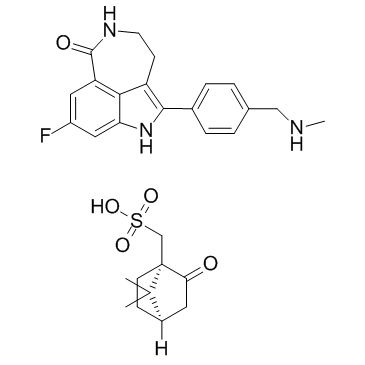Rucaparib Camsylate |
| Catalog No.GC32793 |
Rucaparib (AG014699) monocamsylate is an orally active, potent inhibitor of PARP proteins (PARP-1, PARP-2 and PARP-3) with a Ki of 1.4 nM for PARP1. Rucaparib Camsylate is a modest hexose-6-phosphate dehydrogenase (H6PD) inhibitor. Rucaparib Camsylate has the potential for castration-resistant prostate cancer (CRPC) research.
Products are for research use only. Not for human use. We do not sell to patients.

Cas No.: 1859053-21-6
Sample solution is provided at 25 µL, 10mM.
Rucaparib is an inhibitor of PARP with a Ki of 1.4 nM for PARP1, and also shows binding affinity to eight other PARP domains.
Rucaparib is the most potent PARP inhibitor in enzyme assays (Ki, 1.4 nM), and a possible N-demethylation metabolite of AG14644[1]. The radio-sensitization by Rucaparib is due to downstream inhibition of activation of NF-κB, and is independent of SSB repair inhibition. Rucaparib could target NF-κB activated by DNA damage and overcome toxicity observed with classical NF-κB inhibitors without compromising other vital inflammatory functions[2]. Rucaparib inhibits PARP-1 activity by 97.1% at a concentration of 1 μM in permeabilised D283Med cells[3].
Rucaparib and AG14584 significantly (P < 0.05) increases temozolomide toxicity. Rucaparib (1 mg/kg) significantly increases temozolomide-induced body weight loss. Rucaparib (0.1 mg/kg) results in a 50% increase in the temozolomide-induced tumor growth delay[1]. Rucaparib is not toxic but significantly enhances temozolomide-induced TGD in the DNA repair protein-competent D384Med xenografts. Pharmacokinetics studies also show that Rucaparib is detected in the brain tissue, which indicates that Rucaparib has potential in intra-cranial malignancy therapy[3]. Rucaparib significantly potentiates the cytotoxicity of topotecan and temozolomide in NB-1691, SH-SY-5Y, and SKNBE (2c) cells. Rucaparib enhances the antitumor activity of temozolomide and indicates complete and sustained tumor regression in NB1691 and SHSY5Y xenografts[4].
[1]. Thomas HD, et al. Preclinical selection of a novel poly(ADP-ribose) polymerase inhibitor for clinical trial. Mol Cancer Ther, 2007, 6(3), 945-956. [2]. Hunter JE, et al. NF-κB mediates radio-sensitization by the PARP-1 inhibitor, AG-014699. Oncogene, 2012, 31(2), 251-264. [3]. Daniel RA, et al. Central nervous system penetration and enhancement of temozolomide activity in childhood medulloblastoma models by poly(ADP-ribose) polymerase inhibitor AG-014699. Br J Cancer, 2010, 103(10), 1588-1596. [4]. Daniel RA, et al. Inhibition of poly(ADP-ribose) polymerase-1 enhances temozolomide and topotecan activity against childhood neuroblastoma. Clin Cancer Res, 2009, 15(4), 1241-1249.
Average Rating: 5 (Based on Reviews and 20 reference(s) in Google Scholar.)
GLPBIO products are for RESEARCH USE ONLY. Please make sure your review or question is research based.
Required fields are marked with *




















